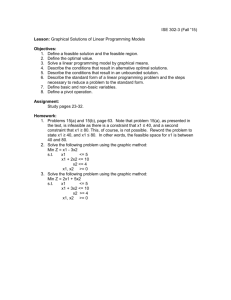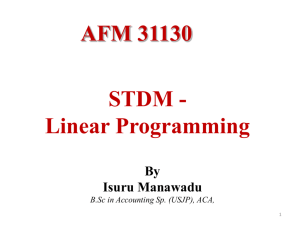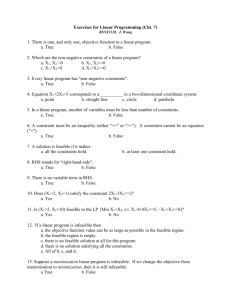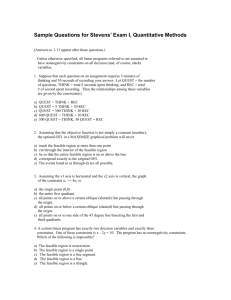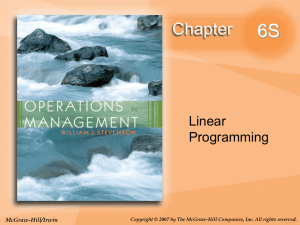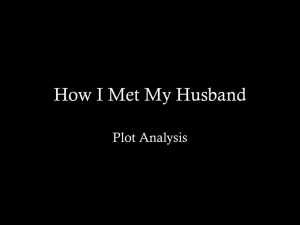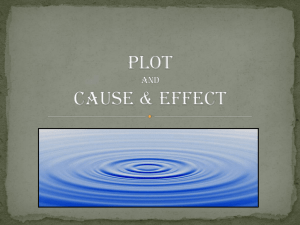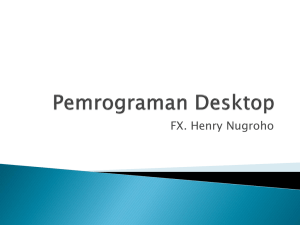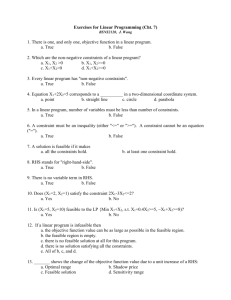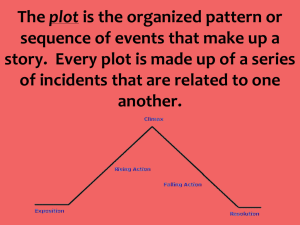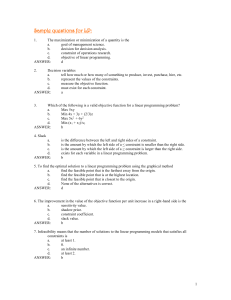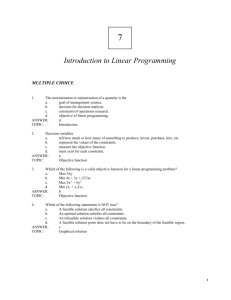L4 Graphical Solution
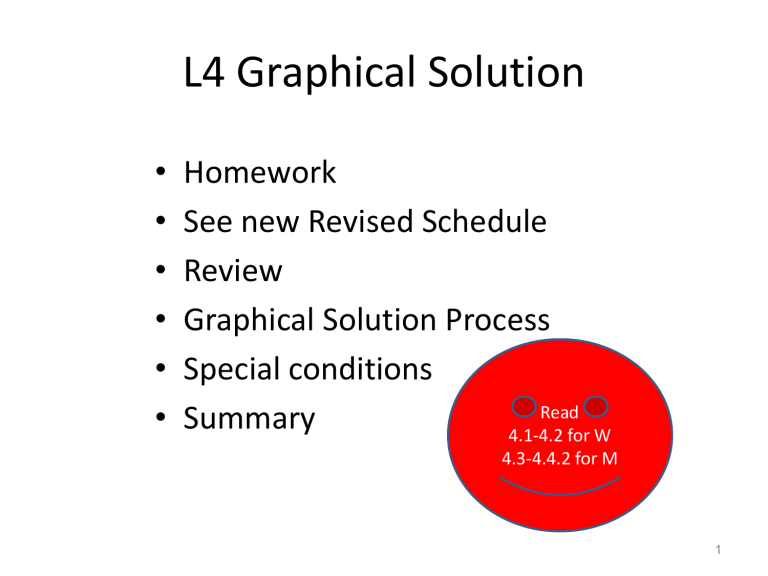
L4 Graphical Solution
• Homework
• See new Revised Schedule
• Review
• Graphical Solution Process
• Special conditions
• Summary Read
4.1-4.2 for W
4.3-4.4.2 for M
1
Results of Formulation
Find x * such that
MINIMIZE : f ( x )
Subject To : h j
( x ) = 0 j = 1 p g i
( x )
0 i = 1 m x i
(L )
x i
x i
(U ) i = 1 n
Design Variables
Objective function
Constraints
2
Min Weight Column - Summary
MIN f ( x )
( 2
Rt ) l
Subject to:
P
2
Rt
a
P
t
R min
min
t
R
3 t
ER
3 t
2
4 l
R max max
3
Constraint Activity/Condition
Constraint Type Satisfied
Equality h ( x )
0
Inequality
Violated h ( x )
0 g ( x ) g ( x )
<
0
0 inactive active g ( x )
>
0
4
Graphical Solution
1. Sketch coordinate system
2. Plot constraints
3. Determine feasible region
4. Plot f(x) contours
5. Find opt solution x* & opt value f(x*)
5
1. Sketch Coordinate System
Look at constraint constants
May have to do a few sketches
Do final graph with st edge
6
Figure 3.1
Constraint boundary for the inequality x
1
+ x
2
16 in the profit maximization problem.
2. Plot constraints g
1
: x
1
x
2
16 g
2
: x
1
28
x
2
14
1 g
3
: g
4
: x
1
14
x
2
24 x
1
0
1 g
5
: x
2
0
Substitute zero for x
1 and x
2
Use straight edge for linear
Use Excel/calculator for Non-linear
7
3. Determine feasible region
Test the origin in all g i
Draw shading lines
!
Find region satisfying all g i g
1
: g
2
: x
1 x
1
x
2
x
2
28
16
14
1 g
3
: g
4 g
5
:
: x
1
14
x
2
24 x
1
0 x
2
0
1
What is a “redundant” constraint?
8
4. Plot f ( x ) contours
P
f ( x )
400 x
1
600 x
2 let P equal a couple constant v alues, e.g.
P
P
2
1
400 x
1
400 x
1
600 x
2
600 x
2
2800
8800
Figure 3.4
Plot of P =4800 objective function contour for the profit maximization problem.
9
5. Find Optimal solution & value
Opt. solution point D x *= [4,12]
Opt. Value
P=4(400)+12(600)
P=8800 f ( x* )=8800
Figure 3.5
Graphical solution to the profit maximization problem: optimum point D = (4, 12); maximum profit, P = 8800.
10
Graphical Solution
1. Sketch coordinate system
2. Plot constraints
3. Determine feasible region
4. Plot f(x) contours (2 or 3)
5. Find opt solution x* & opt value f(x*)
11
Infinite/multiple solutions
When f(x) is parallel to a binding constraint g
2
:
)
x
1
2 x
1
0 .
5 x
2 x
2
8
Coefficient of x
1 and x
2 in g
2 are twice f(x) Figure 3.7
Example problem with multiple solutions.
12
Unbound Solution
Figure 3.8
Example problem with an unbounded solution.
Open region
On R.H.S.
What is a redundant constraint?
13
“Unique” Solution
Recall a typical system of linear eqns
1
5
2
1
3
1
1
1
1
x
1 x
2 x
3
A
3 x 3 x
3
x 1
( x
( 5
1 x
1
( 2 x
1
x
2
3 x
2 x
2
x
3 x
3 x
3
)
)
)
y
3 x 1 h j
( x ) = 0 j = 1 p
The number of independent h j must be less than or equal to n i.e. p ≤ n
14
Infeasible Problem
Constraints are: inconsistent conflicting
Figure 3.9
Infeasible design optimization problem.
How many inequality constraints can we have?
How many active inequality constraints?
15
Non-linear constraints & Inf. Solns
Figure 3.10
A graphical solution to the problem of designing a minimumweight tubular column.
Which constraint(s) are active?
16
Summary
• Graphical solution – 5 step process
• Feasible region may not exist resulting in an infeasible problem
• When obj function is ll to active/binding g i an infinite number of solutions exist
• Feasible region may be unbounded
• An unbounded region may result in an unbounded solution
17
